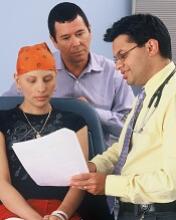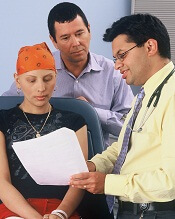User login
MADRID—New research indicates there is a lack of specialized care in Europe for adolescents and young adults (AYAs) with cancer.
In a survey of more than 200 European healthcare professionals, more than two-thirds of respondents said they did not have access to specialized services where adult and pediatric cancer specialists work together to plan treatment and deliver care to AYAs with cancer.
This lack of services was more pronounced in Eastern and Southern Europe than Western and Northern Europe.
“The survey found gaps and disparities in cancer care for adolescents and young adults across Europe,” said study author Emmanouil Saloustros, MD, a consultant medical oncologist at General Hospital of Heraklion “Venizelio” in Heraklion, Crete, Greece.
Dr Saloustros and his colleagues presented these findings at the ESMO 2017 Congress (abstract 1438O_PR) and reported them in ESMO Open.
The researchers sent an online survey on the status of care and research in AYAs (ages 15-39) to members of the European Society for Medical Oncology (ESMO) and the European Society for Paediatric Oncology (SIOPE).
The team received responses from 266 healthcare professionals across Europe—55% of them female. Eleven percent were age 20–29, 29% were age 30–39, 26% were age 40–49, 25% were age 50–59, and 9% were age 60 and older.
Forty-eight percent were medical oncologists, 21% were pediatric oncologists, 8% were in training, 5% were hematologists, 4% were radiation oncologists, and 2% were surgical oncologists. The rest were other types of healthcare professionals, such as oncology nurses.
Fifty-two percent of respondents worked in general academic centers, 19% in specialized cancer hospitals, and 11% in pediatric hospitals. Sixty percent of respondents had been trained to treat adults with cancer, 25% to treat pediatric cancer patients, and 15% were trained to treat both.
In the past year, 32% of respondents had treated between 1 and 10 AYAs, 28% had treated 11 to 20, 17% had treated between 21 and 50, and 16% had treated more than 50 AYAs.
Results
The following results are based on data from 242 survey respondents. (The other respondents did not provide complete information.)
More than two-thirds (67%) of the respondents said they did not have access to specialized services for AYAs with cancer. This was true for 88% of respondents in Southern Europe, 87% in Eastern Europe, 55% in Western Europe, and 40% in Northern Europe.
Sixty-two percent of hematologists said they had access to AYA services, as did 44% of pediatric oncologists and 27% of medical oncologists.
Eighty-six percent of respondents said their AYA patients had access to professional psychological support. This was true for 97% of respondents in Western Europe, 82% in Southern Europe, 81% in Northern Europe, and 74% in Eastern Europe.
Fifty-four percent of all respondents said their AYAs had access to a support group with other young people. This was true for 81% of respondents in Northern Europe, 60% in Western Europe, 48% in Eastern Europe, and 34% in Southern Europe.
Thirty-six percent of all respondents said their AYAs had access to an age-specific specialist nurse. This was true for 53% of respondents in Western Europe, 51% in Northern Europe, 32% in Eastern Europe, and 10% in Southern Europe.
Sixty-two percent of respondents said their institution provided AYAs with access to a fertility specialist. This was true for 78% of respondents in Western Europe, 72% in Northern Europe, 52% in Southern Europe, and 24% in Eastern Europe.
“These patients have specific needs that are not covered by pediatric or general oncology centers or classical medical oncology centers, and this survey shows that most do not have access to the recommended special care,” said Gilles Vassal, director of clinical research at Gustave Roussy in Villejuif, France, and past president of SIOPE (who was not involved in this study).
“Countries without these services can look at existing examples—such as in the UK and France—to build teams equipped to improve survival and survivorship for adolescents and young adults with cancer.” ![]()
MADRID—New research indicates there is a lack of specialized care in Europe for adolescents and young adults (AYAs) with cancer.
In a survey of more than 200 European healthcare professionals, more than two-thirds of respondents said they did not have access to specialized services where adult and pediatric cancer specialists work together to plan treatment and deliver care to AYAs with cancer.
This lack of services was more pronounced in Eastern and Southern Europe than Western and Northern Europe.
“The survey found gaps and disparities in cancer care for adolescents and young adults across Europe,” said study author Emmanouil Saloustros, MD, a consultant medical oncologist at General Hospital of Heraklion “Venizelio” in Heraklion, Crete, Greece.
Dr Saloustros and his colleagues presented these findings at the ESMO 2017 Congress (abstract 1438O_PR) and reported them in ESMO Open.
The researchers sent an online survey on the status of care and research in AYAs (ages 15-39) to members of the European Society for Medical Oncology (ESMO) and the European Society for Paediatric Oncology (SIOPE).
The team received responses from 266 healthcare professionals across Europe—55% of them female. Eleven percent were age 20–29, 29% were age 30–39, 26% were age 40–49, 25% were age 50–59, and 9% were age 60 and older.
Forty-eight percent were medical oncologists, 21% were pediatric oncologists, 8% were in training, 5% were hematologists, 4% were radiation oncologists, and 2% were surgical oncologists. The rest were other types of healthcare professionals, such as oncology nurses.
Fifty-two percent of respondents worked in general academic centers, 19% in specialized cancer hospitals, and 11% in pediatric hospitals. Sixty percent of respondents had been trained to treat adults with cancer, 25% to treat pediatric cancer patients, and 15% were trained to treat both.
In the past year, 32% of respondents had treated between 1 and 10 AYAs, 28% had treated 11 to 20, 17% had treated between 21 and 50, and 16% had treated more than 50 AYAs.
Results
The following results are based on data from 242 survey respondents. (The other respondents did not provide complete information.)
More than two-thirds (67%) of the respondents said they did not have access to specialized services for AYAs with cancer. This was true for 88% of respondents in Southern Europe, 87% in Eastern Europe, 55% in Western Europe, and 40% in Northern Europe.
Sixty-two percent of hematologists said they had access to AYA services, as did 44% of pediatric oncologists and 27% of medical oncologists.
Eighty-six percent of respondents said their AYA patients had access to professional psychological support. This was true for 97% of respondents in Western Europe, 82% in Southern Europe, 81% in Northern Europe, and 74% in Eastern Europe.
Fifty-four percent of all respondents said their AYAs had access to a support group with other young people. This was true for 81% of respondents in Northern Europe, 60% in Western Europe, 48% in Eastern Europe, and 34% in Southern Europe.
Thirty-six percent of all respondents said their AYAs had access to an age-specific specialist nurse. This was true for 53% of respondents in Western Europe, 51% in Northern Europe, 32% in Eastern Europe, and 10% in Southern Europe.
Sixty-two percent of respondents said their institution provided AYAs with access to a fertility specialist. This was true for 78% of respondents in Western Europe, 72% in Northern Europe, 52% in Southern Europe, and 24% in Eastern Europe.
“These patients have specific needs that are not covered by pediatric or general oncology centers or classical medical oncology centers, and this survey shows that most do not have access to the recommended special care,” said Gilles Vassal, director of clinical research at Gustave Roussy in Villejuif, France, and past president of SIOPE (who was not involved in this study).
“Countries without these services can look at existing examples—such as in the UK and France—to build teams equipped to improve survival and survivorship for adolescents and young adults with cancer.” ![]()
MADRID—New research indicates there is a lack of specialized care in Europe for adolescents and young adults (AYAs) with cancer.
In a survey of more than 200 European healthcare professionals, more than two-thirds of respondents said they did not have access to specialized services where adult and pediatric cancer specialists work together to plan treatment and deliver care to AYAs with cancer.
This lack of services was more pronounced in Eastern and Southern Europe than Western and Northern Europe.
“The survey found gaps and disparities in cancer care for adolescents and young adults across Europe,” said study author Emmanouil Saloustros, MD, a consultant medical oncologist at General Hospital of Heraklion “Venizelio” in Heraklion, Crete, Greece.
Dr Saloustros and his colleagues presented these findings at the ESMO 2017 Congress (abstract 1438O_PR) and reported them in ESMO Open.
The researchers sent an online survey on the status of care and research in AYAs (ages 15-39) to members of the European Society for Medical Oncology (ESMO) and the European Society for Paediatric Oncology (SIOPE).
The team received responses from 266 healthcare professionals across Europe—55% of them female. Eleven percent were age 20–29, 29% were age 30–39, 26% were age 40–49, 25% were age 50–59, and 9% were age 60 and older.
Forty-eight percent were medical oncologists, 21% were pediatric oncologists, 8% were in training, 5% were hematologists, 4% were radiation oncologists, and 2% were surgical oncologists. The rest were other types of healthcare professionals, such as oncology nurses.
Fifty-two percent of respondents worked in general academic centers, 19% in specialized cancer hospitals, and 11% in pediatric hospitals. Sixty percent of respondents had been trained to treat adults with cancer, 25% to treat pediatric cancer patients, and 15% were trained to treat both.
In the past year, 32% of respondents had treated between 1 and 10 AYAs, 28% had treated 11 to 20, 17% had treated between 21 and 50, and 16% had treated more than 50 AYAs.
Results
The following results are based on data from 242 survey respondents. (The other respondents did not provide complete information.)
More than two-thirds (67%) of the respondents said they did not have access to specialized services for AYAs with cancer. This was true for 88% of respondents in Southern Europe, 87% in Eastern Europe, 55% in Western Europe, and 40% in Northern Europe.
Sixty-two percent of hematologists said they had access to AYA services, as did 44% of pediatric oncologists and 27% of medical oncologists.
Eighty-six percent of respondents said their AYA patients had access to professional psychological support. This was true for 97% of respondents in Western Europe, 82% in Southern Europe, 81% in Northern Europe, and 74% in Eastern Europe.
Fifty-four percent of all respondents said their AYAs had access to a support group with other young people. This was true for 81% of respondents in Northern Europe, 60% in Western Europe, 48% in Eastern Europe, and 34% in Southern Europe.
Thirty-six percent of all respondents said their AYAs had access to an age-specific specialist nurse. This was true for 53% of respondents in Western Europe, 51% in Northern Europe, 32% in Eastern Europe, and 10% in Southern Europe.
Sixty-two percent of respondents said their institution provided AYAs with access to a fertility specialist. This was true for 78% of respondents in Western Europe, 72% in Northern Europe, 52% in Southern Europe, and 24% in Eastern Europe.
“These patients have specific needs that are not covered by pediatric or general oncology centers or classical medical oncology centers, and this survey shows that most do not have access to the recommended special care,” said Gilles Vassal, director of clinical research at Gustave Roussy in Villejuif, France, and past president of SIOPE (who was not involved in this study).
“Countries without these services can look at existing examples—such as in the UK and France—to build teams equipped to improve survival and survivorship for adolescents and young adults with cancer.” ![]()

